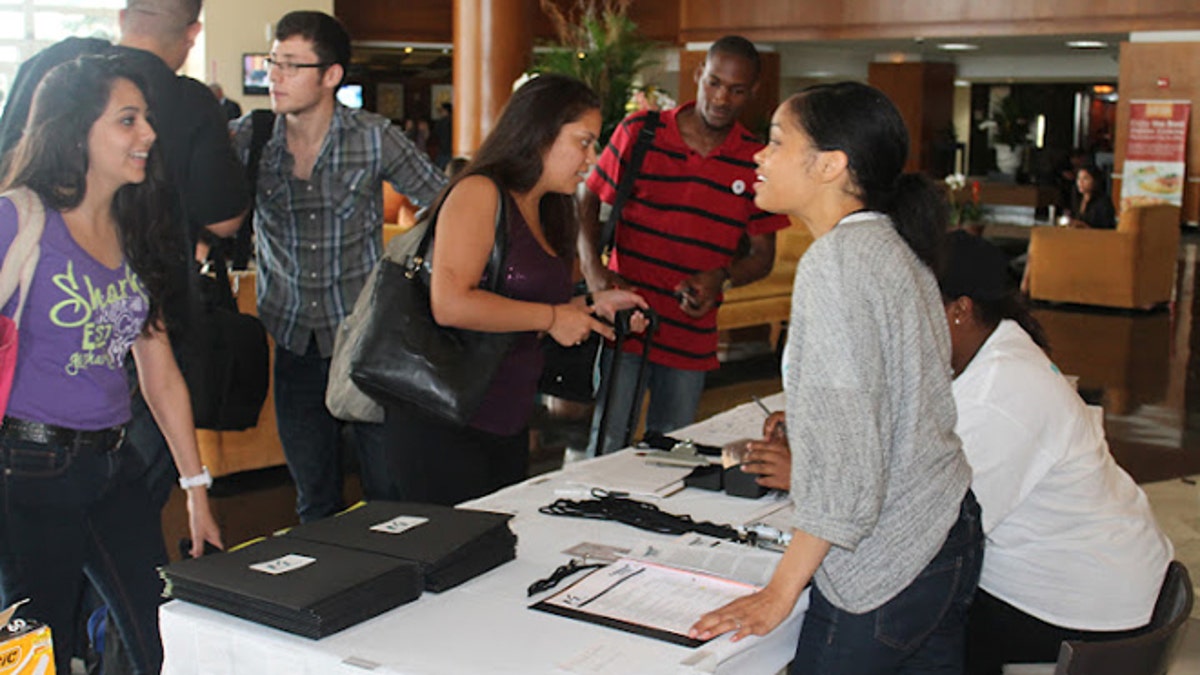
Students arrive at the Mobilize.org Target 2020 Community College Summit in Miami, Florida. (Isa Adney)
In 2010, President Barack Obama announced his goal to raise the college graduation rate to 60 percent by 2020, adding at least 8 million graduates, 5 million from community colleges.
However, only 20 percent of community college students complete their degree within 3 years, and those numbers are even lower for minority students.
Last weekend, over 100 Millennial students (born between 1976-1996) gathered in Miami to voice their concerns and solutions as part of the Mobilize.org Target 2020 Community College Summit.
With the support of the Bill & Melinda Gates Foundation, the Lumina Foundation, and the Knight Foundation, Mobilize.org gave students the opportunity to submit solutions-based college completion projects for a chance at winning a piece of a $25,000 prize.
The summit also engaged students in a conversation about college completion - a conversation in which they have been largely left out.
One of the speakers mentioned that the room of students looked like the future of America, and as the demographics of the event revealed, the minority was the majority:
55% Latino
20% African American
11% Mixed Ethnicity
10% Other/Declined to State
3% White
1% Pacific Islander
The students came from eight Miami-Dade College campuses (the largest college in the nation), Palm Beach College, and Broward College.
Students heard from educational and political leaders in the nation, including the president of Miami Dade College, Dr. Eduardo Padron, former Governor Bob Graham, the Superintendent of Miami-Dade County Public Schools Alberto Carvalho, Executive Director of Miami Dade College Student Success and Completion Initiatives Dr. Lenore Rodicio, and Undersecretary of Education Dr. Martha J. Kanter.
Their speeches highlighted the imminent college completion crisis and encouraged students to be civically engaged.
“Today over 2/3 of jobs created require a post-secondary degree…It wasn’t too long ago that people could graduate with a high school diploma…work in an office and make a salary to buy a house, retire, and then stay at that company for 30 years…Those jobs are gone.” – Dr. Padron
“Community service should be thought of as the front door to civic engagement.” - former Governor Bob Graham
“[Service learning is about reflection], we have lost the reflection piece in our society.” - Dr. Lenore Rodicio
“You have evolved, and the systems around you have not…We need to fix public education…But don’t expect people to rise up all at once…it just takes one. You know what stops an elephant in its tracks? Not lions. Not large bodies of water. A pebble. It all starts with you being a pebble in someone’s foot.” - Alberto Carvalho
“You can do bigger things than you realize…we need you to do those great things. We need to educate the top 100% of students who want an opportunity to get an education.” - Dr. Martha J. Kanter
On the first full day of the summit students gathered in small groups to discuss and vote on what they saw as the top problems and solutions facing college completion today.
Students voted using interactive keypads and a 1-10 scale. The following represents their top answers based:
1. What challenges do students face in completing their education?
“Students are at a loss at the initial start of college. With lack of advisement a student cannot form a plan in which they create successful strategies. Students don't know what classes they should take towards a major - lack of orientation.”
“Finance - lack of money, not enough financial aid. Strict requirements for financial aid.”
“Books for classes - too many editions, teachers never use it. Too expensive, not online, problems getting them.”
2. What can government officials do to improve college completion rates in Florida?
“Lower tuition rates. No extra fees. No higher rates. And stop increasing rates on loans.”
“Increase the money for education (budget) instead of using it for other purposes (i.e. jail, incarceration). The students need that money.”
“The passage of the Dream Act. Rally support within the state for the Dream Act. Create laws to protect undocumented students.”
3. What can administration officials, faculty and staff at academic institutions do to help improve completion rates at our schools?
“Advisement needs to improve - training should be enforced because faculty and staff need to be more motivated to help students succeed.”
“Stop standardizing education. Instead provide students with a well rounded and civically engaged education.”
4. What can Millennials do to ensure we achieve our individual and collective academic goals?
“Become a leader and take a stand - involve yourself in memberships such as clubs and mentorships in order to network and professionalize yourself.”
“Millennials shall not be afraid to invest in the future - Find grants for scholarships and network for your future.”
“As a whole - Millennials should network with others and inform their fellow Millennials on what they can accomplish with focused motivation.”
On the final day of the summit students presented their solutions in the form of projects ranging from an informative college app to a mentorship program for undocumented students. The students’ projects were voted on by their peers, using the interactive keypads, and the top five projects won a piece of the $25,000 prize to implement their ideas.
The entire summit was webcast live to a worldwide audience. The archived feed is now available online.
Stay tuned next week for more information on the student projects, including exclusive interviews with the winning students.








































